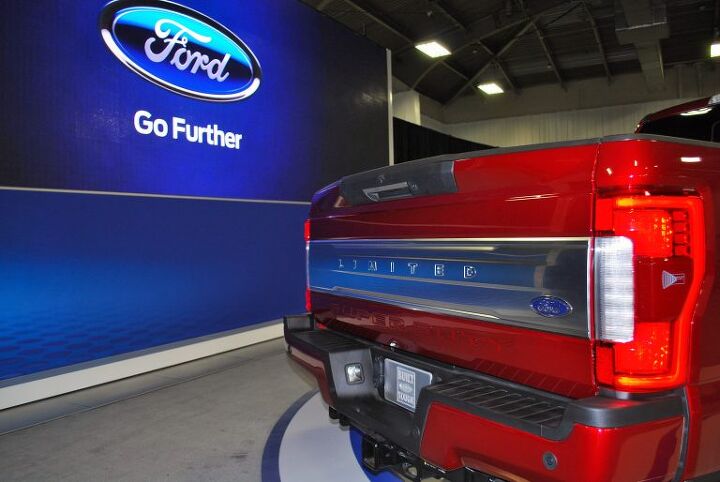#JobCuts
Rivian Suffers Job Cuts, Factory Exempted
I mentioned that Rivian was facing job cuts during today's QOTD, and here's the skinny.
Ford to Cut 1,400 Salaried Positions in U.S. Through Buyout Initiative
Barely a full day after news broke that Ford was on the cusp of announcing layoffs, Ford announced those layoffs. On Wednesday, the automaker informed employees that it needs to eliminate 1,400 salaried jobs as part of its $11-billion restructuring program. The good news is that these cuts will be handled through retirement buyouts that won’t leave the departing workforce empty handed. The automaker’s internal memo also stated that the buyouts would be voluntary.
The Blue Oval previously said it expects a full-year loss in 2020 thanks to the pandemic, with a pre-tax profit of anywhere between $500 million and $1.5 billion in the third quarter.
Ford, BMW Planning Job Cuts In U.S.
With a large number of automakers pinching pennies these days, it’s easy for the details of various restructuring plans to fall down the memory hole. For example, Ford has been engaged in an ambitious cost-cutting program since 2018. The $11-billion plan was said to take anywhere from three to five years to complete, requiring legitimate sacrifices at the company — including the discontinuation of all sedans in the United States, ending operations in Russia, closing facilities in Europe, and rolling layoffs around the globe.
Ford has actually accelerated its timeline to see how much it can get done before 2021, resulting in the elimination of 7,000 salaried positions globally last year. The company has decided to end another 1,000 salaried positions in the United States.
Renault Reports Staggering $8.6 Billion Loss
Already in the midst of a comprehensive restructuring plan with partners Nissan and Mitsubishi, Renault announced a staggering 7.29 billion euro ($8.6 billion) loss on Thursday. That tally encapsulates the first half of the year and marks a new record for the brand, even if it’s not the kind one normally celebrates.
“Although the situation is unprecedented, it is not final. Together with all of the Group’s management teams and employees, we are fully dedicated to correcting the situation through a strict discipline that will go beyond reducing our fixed costs,” new CEO Luca de Meo said in response to the dismal financial report. “Preparing for the future also means building our development strategy, and we are actively working on this. I have every confidence in the Group’s ability to recover.”
Best-laid Plans, and All That: Daimler Cuts Likely to Continue
Daimler plans to turn up the volume on cost-cutting measures due to operating losses in the second quarter that haven’t officially manifested. CEO Ola Källenius believes the damage caused by the pandemic response will be too severe to proceed with business as usual for the rest of 2020. At the company’s annual meeting, held Wednesday, the CEO told shareholders to anticipate additional measures to protect profits.
“Our previous efficiency goals covered the upcoming transformation, but not a global recession. That’s why we are further sharpening our course,” Källenius said, noting that the company is currently in talks with labor representatives. Considering the automaker enacted a plan bent on reducing its workforce by at least 10,000 to save an estimated €1.4 billion ($1.6 billion) by 2022, we doubt those discussions are super cordial.
Automotive Retail Jobs Are In Rough Shape
Having already pulverized the dead horse of waning auto sales into a fine paste, we’ll now turn our focus on how it’s impacting employment among automotive retailers — squashing another pony.
Much of the information up until this point has been anecdotal and conditional to the North American response to COVID-19. Furloughs were rampant as the pandemic progressed and new safety rules seemed poised to cripple sales moving forward. There was an obvious general plight confronting automotive retailers, but we couldn’t nail down what that meant in terms of job losses.
We still don’t, frankly. But it is starting to become obvious that there isn’t much reason to be exceptionally optimistic. AutoNation recently announced that around half of the 7,000 workers it furloughed in April won’t be coming back. Despite some retailers claiming not to need such drastic cuts, plenty are following AutoNation’s model. With fewer customers and sweeping restrictions on how showrooms can be operated, there’s little reason for there to be all hands on deck. But just how many will be forced to abandon ship this year?
BMW Looks to Shed About 6,000 Positions, Ends AV Partnership With Mercedes
Bavaria-based BMW says it aims to cut roughly 6,000 positions from its lineup on account of coronavirus complications. Times are tough and the manufacturer needs to tighten its belt, just like many of its peers.
The alley-oop that precedes the slam dunking of these jobs into the wastebasket will be tempting retirement packages for those of a certain age. But BMW also said it is interested in offering younger people financial assistance for full-time higher education with a guarantee of a job when they’re done — offering some amount of hope.
Bentley Slashes Jobs, Predictably Delays First EV
Bentley Motors plans to quash roughly a quarter of its workforce. Not long ago, following a profitable 2019, CEO Adrian Hallmark said that the brand was on track to have a stellar 2020.
Alas, it was not to be.
The coronavirus lockdowns left Bentley losing £88 million ($111 million USD) for each month of lost production and sales, throwing the whole year out of whack. Much like the mucus man writing the sentence you’re reading now, it would seem high-end British nameplates (despite Bentley ownership by Volkswagen Group) aren’t in the best health. Aston Martin recently announced the cutting of 500 positions, while McLaren had to axe 1,200 jobs in May.
Uber Death Watch: Ride-hailing Firm Cuts 3,000 Additional Jobs
Uber Technologies eliminated an additional 3,000 jobs on Monday, closing offices around the world as certain regions revealed less growth than the outfit had hoped for. We covered the ride-hailing firm’s financial situation last week, as reports circulated that it wanted to drop a few billion to acquire Grubhub and enhance its own food-delivery service in the wake of the coronavirus pandemic.
At the time, the firm had already cut 3,700 jobs pertaining to customer support and human resources. Even in the absence of people shunning shared transportation and local governments forcing citizens to stay indoors, Uber’s preexisting inability to turn a profit would probably have forced the company to restructure eventually. The pandemic pinned the accelerator to the floor mat, however, likely forcing additional cuts by the company’s own admission. Considering Uber has already axed about a quarter of its global workforce, it’s probably time to place it on death watch.
Daimler: Here Come the Savings, There Go the Jobs
In November, Daimler announced a restructuring plan that called for the elimination of 10,000 jobs, claiming the effort would result in an estimated 1.4 billion euros ($1.5 billion) in savings by the end of 2022. Chairman Ola Källenius may just be getting warmed up.
According to German outlet Handelsblatt, sources within the company claim austerity measures will be expanded at Tuesday’s investor conference. Källenius is said to raise the job cut figure to 15,000 while scaling back (or dropping) several side businesses that aren’t turning a profit. As well, the automaker will likely axe a few models that don’t fit in with the core brand’s luxury image, starting with the Nissan Navara Mercedes-Benz X-Class.
At Audi, EV Push Comes With a Side of Job Cuts
Like parent Volkswagen, premium auto brand Audi is embarking on an electrified journey and, like VW, it would prefer to see the route paved with profits. A difficult task, given the expense of developing such powertrains and the currently limited public demand for the vehicles they power.
Still, Audi is determined to see it through, hoping that one day, perhaps at the mid-point of the coming decade, it will be able to turn a healthy profit off of EVs in a marketplace that’s more receptive of the technology. To get to that promised land, the company will need to free up cash, and it plans to find that dough in its labor costs.
Expect cuts, the company claims.
Mercedes Confirms Job Cuts in $1.4 Billion Restructuring Plan
On Thursday, Daimler made an announcement confirming earlier reports that it plans to cut roughly ten percent of its management staff as part of a broader restructuring plan. Financial hardship has become a sign of the times for the auto industry. Most sizable manufacturers are coming off an investment spree aimed at developing new-energy vehicles, autonomous driving systems, and connected services. Unfortunately, those commitments came at roughly the same time the world’s largest auto markets started to collectively plateau.
A broad approach no longer seems feasible for all but the absolute largest automakers on the planet. We’ve seen many attempt to downsize through restructuring or by entering inte partnerships with other firms to share costs — sometimes both. Knowing this as well as anyone, Daimler issued two profit warnings this year as Mercedes-Benz was fined $960 million in an emissions-cheating settlement while hemorrhaging cash through EV investments.
Analysts: Recent Automotive Job Cuts Are Just the Beginning
Over the last six months, automakers have announced roughly 38,000 job cuts as part of global restructuring efforts. While such things are typically part of the normal ebb and flow of the industry, the ebb could be a prolonged one as manufacturers seek ways to mitigate the high cost of tech and figure out what their businesses should look like in the 21st century.
A litany of other issues are impacting jobs. China’s economy turned out to be less stable than presumed, trade tensions have escalated in practically every major market that builds cars, and most of the developed world appears to be nearly tapped out in terms of sales growth.
As a result, analysts are growing concerned that the layoffs we’ve seen thus far are just the beginning. But they’re not the only ones. Industry insiders are also willing to admit that times are changing — and rather drastically.
Ford Axing More White Collar Workers In Company Overhaul
Yesterday, our man Steph Willems chronicled the details of a memo obtained by The Detroit News in which Ford brass promised 2019 will be a pivotal year for the company. Amongst the revelations, CEO Jim Hackett said a job cull is the price it must pay for adding so many new employees after the recession.
That was confirmed today, with news that some salaried workers in departments such as accounting and human resources will get their walking papers later this year.
Ford Likely to Eliminate 10 Percent of Global Workforce: Report
The Ford Motor Company is allegedly preparing for a sweeping reduction of its global workforce. Harder days for the auto industry have been a long time coming, but reports claim the impending layoffs are specifically related to shoring up finances and turning around the company’s lagging stock valuation — meaning Ford could be the canary in the coal mine or a lone company desperate to bolster its own profitability and get angry shareholders off its back.
While the automaker has not yet confirmed the cuts, there is every indication an announcement will be made soon. When confronted with the matter, representatives have been careful to make noncommittal statements and doubly cautious not to deny anything.
“We remain focused on the three strategic priorities that will create value and drive profitable growth, which include fortifying the profit pillars in our core business, transforming traditionally underperforming areas of our core business and investing aggressively, but prudently, in emerging opportunities,” Ford said in an official statement. “Reducing costs and becoming as lean and efficient as possible also remain part of that work. We have not announced any new people efficiency actions, nor do we comment on speculation.”





























Recent Comments